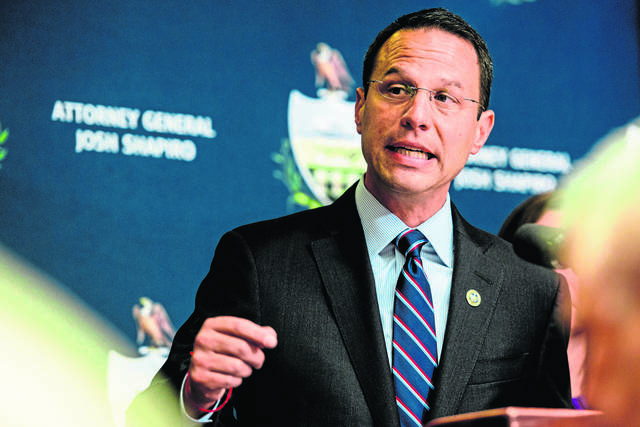Pennsylvania Court Ruling May Open Door for Future Clergy Sex Abuse Suits
By Deb Erdley
Lawyers for clergy sexual abuse survivors say a Pennsylvania Superior Court ruling handed down Tuesday could open a path for many old claims previously timed out to go to a jury. Writing in a 38-page opinion, a three-judge panel overturned a Blair County judge’s decision to dismiss a clergy sexual abuse complaint as outside the statute of limitations for child sexual abuse, which expires at the alleged victim’s 30th birthday. The judges said the church’s apparent failure to notify parishioners of abuse allegations raised the specter of conspiracy and fraudulent concealment as questions for a jury. Renee A. Rice, who claims she was sexually abused beginning when she was 9 by the Rev. Charles F. Bodziak for five years in the 1970s and ’80s, filed suit shortly after a 2016 grand jury report detailed widespread allegations of abuse and cover-ups going back decades. Unlike hundreds of other lawsuits that were dismissed as outside the statute of limitations, Rice’s suit charged the church not with negligence because of sexual abuse but with conspiring to conceal acts that it had a duty to report. Writing for the panel, Superior Court Judge Deborah Kunselman agreed that Rice’s suit had standing to go to a jury because there was no way she could have known of the allegations of widespread abuse prior to the grand jury investigation. “None of the Commonwealth’s prosecutors, investigators or child protection departments discovered the Diocesan defendants’ alleged conduct for over 50 years. Thus, we cannot fairly conclude that Ms. Rice’s similar failure to discover their alleged conduct was unreasonable, as a matter of law,” Kunselman wrote. Eric Anderson, a Pittsburgh lawyer who represents the Altoona-Johnstown diocese, said his clients have yet to decide whether to appeal the ruling, “We’re still reviewing it,” Anderson said. University of Pennsylvania law professor Marci Hamilton, who monitors child sexual abuse cases nationally as CEO and founder of ChildUSA, called the new ruling groundbreaking. “It is a dramatic departure for the Pennsylvania courts,” Hamilton said. “It reeks of common sense, which is a big step forward in the state of Pennsylvania. It is definitely a path forward in circumstances where they can prove that the defendant knew about the perpetrator and covered it up. It is tailor made for the cover-up case. It opens up possibilities for a lot of victims in the 2018 grand jury report and those from 2016.” Altoona lawyer Richard Serbin, who handled Rice’s original complaint, and Pittsburgh attorney Alan Perer, who handled the appeal, said the ruling represents a breakthrough for abuse survivors who were previously barred from court by the statute of limitations on sexual abuse. Perer credited the Pennsylvania Attorney General’s grand jury reports — a 2016 report on the Altoona-Johnstown diocese and the August 2018 report that detailed allegations of abuse and cover-up against 301 priests in six dioceses — with changing the way courts look at such cases. ‘The grand jury reports were a major factor. They showed the systemic cover-up and exposed the secret archives that no one had access to before the grand jury brought them to the forefront,” Perer said. Serbin, who first uncovered the existence of the archives more than 25 years ago, said he watched the courts dismiss hundreds of cases based on the statue of limitations for child sexual abuse before deciding to focus on the church’s concealment of such charges in the Rice case. “I’m thrilled we came up with a course of action that worked. … Finally, child sexual abuse survivors have an opportunity to seek justice in a court of law, by a jury of their peers, rather than being stopped at the courthouse door,” Serbin said. The new ruling follows the failure of repeated efforts by lawmakers to create a two-year window of opportunity for child sexual abuse survivors timed out by the statute of limitations to file suit. Perer, who has 21 similar complaints pending against the Pittsburgh diocese and two against the Greensburg diocese, said he decided to hold off on filing any more cases while the Superior Court was weighing the Rice case. He said his clients will be reviewing offers from diocesan compensation funds in a new light, now that the court’s ruling could provide many of them with a path to trial. Mitchell Garabedian, the Boston lawyer who handled cases profiled in the film “Spotlight” and has 75 cases pending in Pennsylvania, echoed Perer and Serbin. He said the Pennsylvania ruling is similar to one handed down recently in Massachusetts. “Courts are starting to look at this differently. The court in Pennsylvania is sending a loud and clear message that the window now may be open for victims to file fraudulent concealment in cases where the statute of limitations barred them from pursuing their abusers in court. “The ramifications of the ruling could be significant not only in clergy sexual abuse cases but in abuse cases across the Commonwealth of Pennsylvania,” he said. Deb Erdley is a Tribune-Review staff writer. You can contact Deb at 724-850-1209, derdley@tribweb.com
|
.
Any original material on these pages is copyright © BishopAccountability.org 2004. Reproduce freely with attribution.
